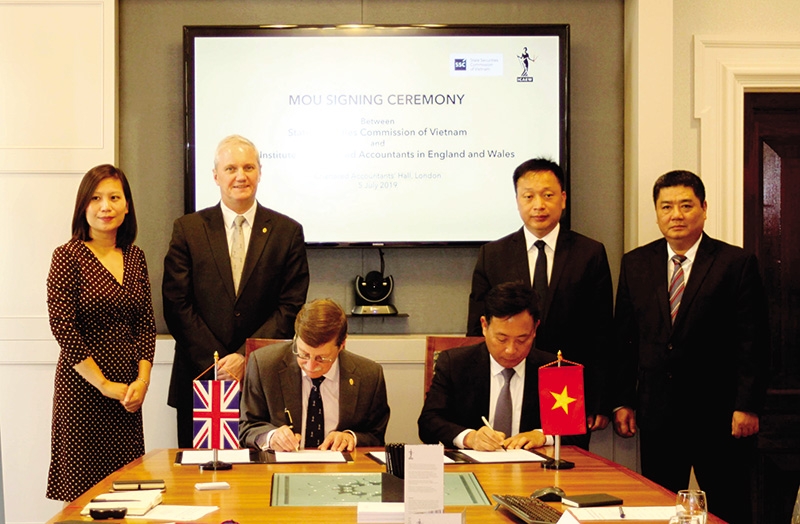Advanced accounting practices to set Vietnam on route to sustainability
Vietnam is now formulating its economic development strategy for the next 10 years based on scientific and technological advancements and labour productivity improvement. What does Vietnam need to materialise this strategy?
 |
| Dang Thi Mai Trang, chief representative of the Institute of Chartered Accountants in England and Wales |
Over the past years, Vietnam has harvested impressive economic achievements, with GDP growth always topping the Southeast Asian region. However, headwinds from across the world have been dampening the global economic outlook, with negative implications for Southeast Asia and Vietnam.
According to an economic update for Southeast Asia announced by the Institute of Chartered Accountants in England and Wales (ICAEW) and Oxford Economics announced in September 2019, it is expected that Vietnam’s economic growth will be about 6.3 per cent in 2020 and then reduce to about 6 per cent each year in the 2020-2021 period.
In order to maintain its high growth and ensure sustainability amidst global uncertainties, Vietnam should prioritise improving the quality of human resources and increasing labour productivity via innovations. Besides, Industry 4.0, which is taking the world by storm, will harangue in great opportunities for nations like Vietnam to achieve rapid and sustainable economic development. Thus, the acceleration of the application of science and technology in all economic sectors, from the public to the private spheres, needs to be prioritised.
What should Vietnam pay attention to in order to take advantage of opportunities from Industry 4.0?
The world is witnessing rapid changes caused by Industry 4.0. If we use our advantages properly and make good preparations for these changes, enterprises and the nation as a whole will be able to leapfrog in development – but if we miss this window of opportunity, we will be left behind and economic development will be undermined.
Industry 4.0 provides big opportunities for Vietnam to approach new technological achievements and create economic breakthroughs setting it on a more sustainable path. We highly appreciate the strong determination, efforts, and the proactivity of the Vietnamese government in formulating policies and drawing up roadmaps for Industry 4.0.
We do believe in the success of policies boosting sci-tech development and innovation in all sectors and promoting national digital transformation, including digital-based economic development and e-administration, and that Vietnam will soon become a modern industrial nation.
What do local businesses need to do to take advantage of these opportunities?
The big opportunities posed by Industry 4.0 to the business community are quite clear. However, to capitalise on these opportunities, they need to take the initiative for their own solutions. They must continuously update and apply advanced technologies to their production in order to improve product quality and labour productivity.
In addition, they also need to engage in digitalisation by applying new technologies such as big data and the Internet of Things in their work processes and governance. This will help them reduce operational costs and operate more effectively and competitively. These are the prerequisite factors that can help enterprises with sustainable development.
However, in the application and operation of modern technology, high-quality human resources will play a pivotal role. This shows that a long-term HR development strategy is essential for all enterprises in the 4.0 era.
For example in the financial sector, when financial services change as a result of impacts from AI, blockchain, cybersecurity, and big data, accountants must also change their role and master new skills.
Specifically, the support of technology will reduce the time accountants have to spend on repetitive work, such as taking note of books, storing, reporting, and comparison. Thus, accountants can spend more time doing high-added-value activities such as data analysis and strategic consultancy, which require more knowledge and expertise.
However, to reach this stage, businesses need to consecutively invest into re-training and improving the knowledge of accounting experts, and talk to them about the benefits of technological changes and how it can contribute to the sustainable growth of the business.
 |
| The ICAEW and the State Securities Commission signed a co-operation agreement at an investment promotion conference in the United Kingdom |
One of the tasks set out by the ICAEW is to contribute to the socio-economic development of localities where the ICAEW operates. Could you elaborate on this?
We have been at the heart of the accountancy profession since we were founded in 1880 to ensure trust in business. We share our knowledge and insight with governments, regulators, and business leaders worldwide as we believe accountancy is a force for positive economic change across the world.
There are over 1.8 million chartered accountants and students around the world – talented, ethical, and committed professionals who use their expertise to ensure we have a successful and sustainable future.
Over 180,000 of these are ICAEW Chartered Accountants and students. We train, develop, and support each one of them so that they have the knowledge and values to help build local and global economies that are sustainable, accountable and fair.
What activities and programmes will the ICAEW implement in Vietnam as part of its efforts to help the country develop?
In Vietnam, the ICAEW’s mission is to enhance the professionalism of the financial, accounting, and auditing sectors, in addition to contributing to the development of the business community and of the Vietnamese economy.
In almost five years of official operations in Vietnam, this mission has been realised by the ICAEW with many activities focusing on three important areas: co-operation with the government, co-operation with training organisations, and the development of a strong community of accountants. In the time to come, we will continue boosting these activities.
Specifically, the ICAEW will continue supporting government agencies and policymakers by inviting leading international experts to Vietnam to share their expertise and knowledge, and help improve the capacity of personnel via training programmes and using the ICAEW’s database throughout the world.
We also had co-operation activities with the Ministry of Finance and the State Audit of Vietnam. Especially, we have recently inked an MoU with the Ministry of Education and Training to promote the application of the Vietnamese national framework for reference and co-operate in formulating output standards for university curriculum for finance-accounting that can meet the requirements of sectors and the profession.
In addition, the ICAEW has also boosted co-operation with domestic training organisations and universities in order to improve the quality of lecturers and students. This aims to help education catch up with the development of sectors and professions in the region and the wider world.
Besides granting the ICAEW’s internationally-recognised certificates to students, we have also supported them with soft skills training courses and co-operated with global financial firms in order to give more international employment opportunities to Vietnamese students.
In the time to come, we will continue boosting the construction and the development of expert communities, connecting all stakeholders to join forces and help Vietnam develop. Recently, we have collaborated with the United Nations Development Programme to organise Outreach Day 2019 themed 17 Global Goals for students in Hanoi and Ho Chi Minh City. The programme aimed to raise the awareness among young people in Vietnam who can contribute to developing enterprises, the country, and the whole world to step towards sustainability, ensuring equality and enshrining community and social values.
What the stars mean:
★ Poor ★ ★ Promising ★★★ Good ★★★★ Very good ★★★★★ Exceptional
Related Contents
Latest News
More News
- Masan Consumer names new deputy CEO to drive foods and beverages growth (February 23, 2026 | 20:52)
- Myriad risks ahead, but ones Vietnam can confront (February 20, 2026 | 15:02)
- Vietnam making the leap into AI and semiconductors (February 20, 2026 | 09:37)
- Funding must be activated for semiconductor success (February 20, 2026 | 09:20)
- Resilience as new benchmark for smarter infrastructure (February 19, 2026 | 20:35)
- A golden time to shine within ASEAN (February 19, 2026 | 20:22)
- Vietnam’s pivotal year for advancing sustainability (February 19, 2026 | 08:44)
- Strengthening the core role of industry and trade (February 19, 2026 | 08:35)
- Future orientations for healthcare improvements (February 19, 2026 | 08:29)
- Infrastructure orientations suitable for a new chapter (February 19, 2026 | 08:15)

 Tag:
Tag:



















 Mobile Version
Mobile Version